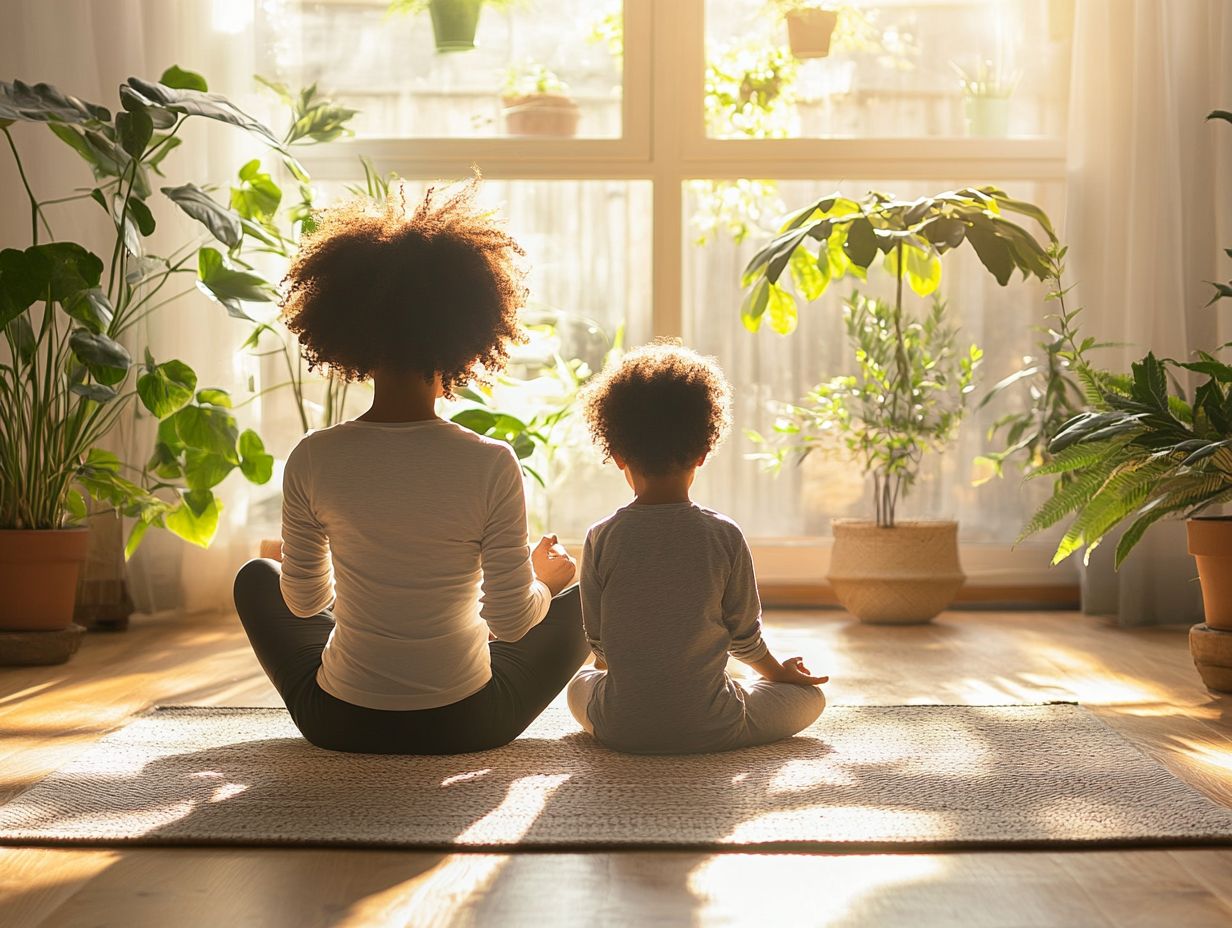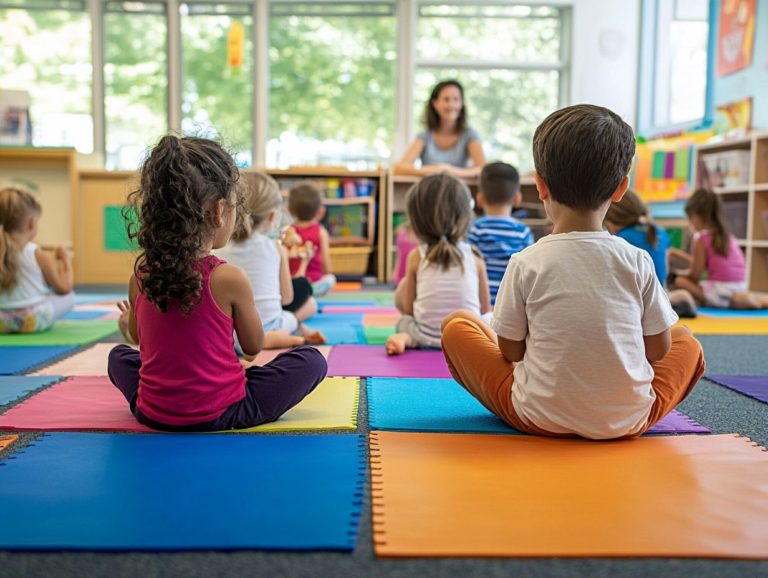Mindfulness and Parenting: Creating a Peaceful Home
In the whirlwind of parenting, discovering tranquility amidst the chaos often resembles an uphill climb. Mindfulness emerges as a transformative remedy, equipping you with essential tools to nurture peace and awareness within your daily life. Embracing mindful parenting is key to achieving this balance.
Get ready to discover the exciting world of mindfulness! This article explores its core, highlighting advantages for both you and your children while offering practical methods to seamlessly integrate mindful practices into your family routines. Your parenting toolbox will be enriched with techniques fostering healthy habits and relationships.
Uncover how embracing mindfulness can significantly reduce stress, enhance communication, and strengthen the bond between you and your child. Ultimately, this fosters a more harmonious home environment filled with mutual respect and understanding.
Immerse yourself in this exploration to elevate your parenting journey!
Contents
- Key Takeaways:
- What Is Mindfulness?
- How Does Mindfulness Benefit Parenting?
- 3. Improves Communication and Connection
- How Can Parents Practice Mindfulness?
- Mindful Parenting Activities
- How Can Mindfulness Create a Peaceful Home?
- How Can Mindful Parenting Benefit Children?
- Frequently Asked Questions
- How can mindfulness help create a peaceful home?
- How can I practice mindfulness as a busy parent?
- What are some practical ways to incorporate mindfulness into daily parenting?
- How can mindfulness improve my relationship with my children?
- What are the benefits of creating a peaceful home through mindfulness?
Key Takeaways:
Here are the essential insights you can gain from practicing mindfulness in parenting:

- Mindfulness helps parents reduce stress and increase patience and empathy in parenting.
- Practicing mindfulness through activities like breathing, listening, and eating can create a peaceful home.
- Mindful parenting can benefit children by improving their mental and emotional well-being, developing resilience and coping skills, and enhancing social and communication skills.
What Is Mindfulness?
Mindfulness is a practice deeply anchored in awareness and presence. It elevates your parenting approach think peaceful parenting by nurturing strong relationships, emotional intelligence, and spiritual guidance.
This practice calls for a conscious focus on your thoughts, feelings, and actions in the here and now. It fosters emotional regulation and self-care practices that support your child’s healthy development.
By weaving mindfulness into your family s dynamics, you can cultivate a nurturing environment that prioritizes mutual respect, empathy, and love. This approach not only leads to a joyful home but also encourages healthier habits and flexible routines for every family member.
How Does Mindfulness Benefit Parenting?
Mindfulness brings a wealth of advantages to parenting. It enriches your emotional intelligence and equips you with effective tools for conflict resolution, positive discipline strategies, and flexible routines.
By embracing a mindful presence, you can truly listen to your children and establish healthy boundaries. This approach allows you to tackle parenting challenges with both patience, love, and self-compassion.
This intentional approach not only deepens the bond between you and your child but also fosters healthy development and emotional well-being in them. Ultimately, it transforms family life into a more harmonious and connected experience.
1. Reduces Stress and Anxiety
Mindfulness is an invaluable tool for you as a parent. It helps to reduce stress and anxiety while allowing you to navigate the unpredictable journey of parenting with greater ease and emotional well-being.
By embracing practices like deep breathing and self-compassion, you can cultivate a calm atmosphere at home. This minimizes the impact of daily stressors and fosters a nurturing environment for your children. Consider incorporating teachings from books like Raising Good Humans and The Big Bad Wolf Learns to Chill Out.
Engaging in meditation provides you with precious moments of tranquility that promote reflection and self-awareness. This ultimately strengthens the bonds within your family. When you practice deep breathing exercises together, you create a unique opportunity for connection, managing tension during challenging times more effectively.
Incorporating relaxation techniques, such as progressive muscle relaxation, enhances your emotional regulation. This equips you with the tools to respond thoughtfully rather than react impulsively. Ultimately, these mindfulness practices not only elevate your individual well-being but also contribute to a more harmonious household where emotional health flourishes.
Consider using spiritual guidance, like Christian meditations, to deepen this practice, drawing on scriptures such as Romans 12:18 to foster peace. This can help create an inclusive environment for all family members.
2. Increases Patience and Empathy
Practicing mindfulness can significantly enhance your patience and empathy as a parent. This allows you to respond to your children’s needs with love and understanding. By being present and engaging in active listening, you can forge a deeper connection with your children’s emotions. This fosters a nurturing environment that emphasizes respect and kindness. Parenting courses like those offered by Laura Linn Knight can provide additional strategies and support.
This practice encourages you to shift your perspective. It enables you to view challenging behaviors through a lens of compassion rather than frustration. For instance, when your child throws a tantrum in a public setting, a mindful approach helps you recognize that the outburst arises from overwhelming feelings rather than simple disobedience. This awareness nurtures your emotional intelligence, guiding you to respond with patience instead of reacting impulsively.
During moments of sibling rivalry, mindfulness allows you to step back and facilitate constructive dialogue. This ultimately builds stronger family bonds and teaches conflict resolution skills. Such approaches not only support your children’s development but also cultivate a peaceful atmosphere in your home. Books like Break Free from Reactive Parenting offer additional insights into managing these challenges.
3. Improves Communication and Connection
Mindfulness is essential for enhancing communication and connection between you and your children. It fosters healthy family dynamics that lay the groundwork for positive parenting. When you engage mindfully in conversations and practice active listening, you can forge deeper relational connections. This cultivates a joyful home environment brimming with love and understanding.
This heightened awareness aids in navigating typical family challenges, such as resolving conflicts and establishing house rules. During disagreements, employing mindfulness enables you and your family members to express thoughts calmly and respectfully. You can direct focus on the issue at hand rather than allowing emotions to steer the conversation. This approach is emphasized in positive parenting techniques and parenting resources found in texts like The Life-Changing Magic of Tidying Up.
Implementing structured family meetings where everyone is encouraged to speak openly fosters a culture of dialogue. Teaching your children the importance of pausing taking a breath before responding can significantly enhance their ability to communicate thoughtfully.
By integrating these mindful strategies, you not only elevate your conversations but also strengthen the bond between you and your children. This makes every family interaction more meaningful and constructive. Christian parenting resources can offer valuable spiritual guidance to deepen these connections.
How Can Parents Practice Mindfulness?

As a parent, you have the opportunity to embrace mindfulness through a variety of techniques. These not only enhance your parenting but also nurture emotional intelligence in your children. Parenting tips from experts like Ralphie of Simply on Purpose can provide additional strategies and insights.
By practicing mindful breathing, engaging in active listening, and participating in child-friendly activities, you can cultivate a serene parenting environment. This promotes emotional well-being and fortifies family connections. Incorporate kid-friendly activities from books like Wolf s Mindful Tales to enhance these experiences.
Integrating these practices into your daily routine enables you to develop a mindful presence. This enriches both your personal journey and the joyful home you create for your family.
We encourage you to share your own mindfulness practices or try out these techniques. Let us know how they work for you!
1. Mindful Breathing
Mindful breathing stands as a cornerstone technique in mindfulness, enabling both parents and children to cultivate self-regulation (the ability to control one s emotions and behaviors) and emotional intelligence (the ability to understand and manage emotions). By dedicating a few moments to focus on their breath, parents can foster a serene atmosphere that not only alleviates stress but also demonstrates emotional maturity for their children. Parenting courses like those by Hunter Clarke-Fields highlight the importance of these practices.
This technique is as simple as it is effective: seek out a quiet space, close your eyes, and take a deep breath in through your nose, counting to three, then exhale slowly through your mouth. Incorporating mindful breathing into daily routines whether before meals or during homework breaks can significantly reduce stress and enhance focus.
By making this practice a regular part of life, you create a nurturing environment where both you and your children feel secure and understood. This, in turn, strengthens your bond and enhances overall well-being. Encouraging your children to partake in these exercises will help them develop resilience and a more effective approach to managing their emotions. Parenting experts like Laura Linn Knight endorse these techniques for their long-term benefits.
2. Mindful Listening
Mindful listening is an essential practice that enhances communication and emotional connection between you and your child. By fully engaging in active listening, you demonstrate to your child that their thoughts and feelings are valued, fostering a sense of respect for each other’s feelings and thoughts and understanding.
This practice requires a conscious effort to eliminate distractions, allowing for a genuine connection. You can achieve this by creating a calm environment, putting away devices, and maintaining eye contact, which conveys your undivided attention. Utilizing parenting resources and tips can further enhance this practice.
By adopting your child’s perspective and asking open-ended questions, you can facilitate deeper conversations that nurture emotional intelligence. This approach not only strengthens your bond with your child but also equips them with the skills to articulate their emotions and viewpoints effectively in other relationships throughout their lives. Books like Current Psychology can offer further insights into these techniques.
3. Mindful Eating
Let s dive into mindful eating, which invites you and your children to cultivate healthy habits and develop a genuine appreciation for food, enriching your family dynamics and fostering a profound sense of gratitude. By being present at the table during meals, you can strengthen your connections and create a calming atmosphere that enhances your shared dining experiences. Engaging in positive statements that encourage good feelings before meals can add to this practice, fostering a joyful home environment.
This practice not only nurtures emotional well-being but also supports the healthy development of your children’s attitudes toward food. By embracing mindful eating techniques like discussing the origin of each dish or involving your children in meal preparation you will boost your family s communication and promote positive parenting approaches and healthy habits.
Setting aside dedicated mealtime free from distractions, where phones and televisions are turned off, allows everyone to focus on the food and one another. In doing so, you create a space for open discussions, reducing stress and anxiety around eating, ultimately nourishing both the body and the spirit, promoting strong relationships.
By integrating these mindful practices into your daily life, you not only enhance your parenting skills but also create a loving and supportive environment for your children. Start today to reap the long-term benefits of mindfulness together as a family.
Mindful Parenting Activities
Are you looking to strengthen your family bonds and support your child’s emotional growth? Engaging in mindful parenting activities can significantly elevate your family connection and nurture emotional intelligence in your children, creating enriching experiences that foster a supportive environment. Activities like mindfulness games, nature walks, and collaborative creative projects not only strengthen the bond between you and your children but also cultivate peace and joy throughout your parenting journey.
Integrating these activities into your daily routine can be both straightforward and rewarding. For instance, dedicating time each week for a family nature walk not only allows you to explore the great outdoors but also creates a perfect opportunity for open conversations about feelings and experiences, enhancing your family dynamics.
Mindfulness games, such as focusing on your breath or practicing gratitude, can easily be introduced during stressful moments, equipping your children with invaluable coping skills. Creative projects whether painting, crafting, or cooking together promote collaboration and self-expression. These activities reinforce the emotional connections that are vital for healthy family dynamics and strong relational connections.
How Can Mindfulness Create a Peaceful Home?
Embracing mindfulness transforms your home into a sanctuary of peace, enhancing emotional regulation, facilitating effective communication, and nurturing positive discipline strategies that contribute to a joyful family dynamic.
By weaving mindfulness practices into your daily routines, you cultivate a serene atmosphere where your children feel safe, valued, and understood, ultimately fostering their emotional well-being and supporting their healthy development.
1. Promotes Calmness and Emotional Regulation

Mindfulness serves as a powerful ally in promoting calmness and emotional regulation, enabling you to respond to challenging situations with patience and understanding. By embracing mindfulness, you transform your home into a sanctuary of peace, where emotions are acknowledged and managed effectively, ultimately fostering a harmonious atmosphere and a joyful home.
This practice encourages you to pause and reflect before reacting, enabling you to break the cycle of stress and anxiety that often accompanies parenting. When you learn to navigate difficult moments with emotional awareness, you enhance your own well-being and model healthy coping strategies for your children, nurturing their resilience in the face of adversity and fostering emotional maturity.
As you cultivate a mindful approach, your communication becomes more effective, strengthening your relationships and enhancing mutual understanding. Ultimately, this emotional regulation benefits not just you, but also equips your children with essential life skills, creating a nurturing environment where everyone can truly thrive and experience harmonious relationships.
2. Encourages Positive Discipline
Mindfulness fosters positive discipline by helping you understand and empathize during conflicts, enabling you to guide your child’s behavior constructively. Rather than reacting in frustration, you can choose to approach discipline with love, patience, and mutual respect.
By weaving mindfulness into your daily parenting practices, you cultivate an environment that prioritizes learning over punishment. For example, when your child misbehaves, pause and breathe deeply. Then, engage in a conversation about the behavior and its impact on others instead of jumping straight to punishment. This method teaches your child the consequences of their actions and helps them cultivate empathy and self-regulation.
Set aside time for family mindfulness activities, such as meditation or reflective discussions. These moments can strengthen your connections and provide ongoing opportunities to impart valuable life skills. Additionally, by creating a safe space for open dialogue, where your children feel comfortable expressing their feelings, you enhance the positive discipline approach, fostering trust and cooperation in your family and promoting mutual respect.
3. Fosters a Stronger Parent-Child Bond
Practicing mindfulness helps strengthen the relationship between parents and children. It enhances emotional connection and understanding within your family dynamics.
When you engage mindfully with your children, you create a nurturing environment that prioritizes emotional intelligence, which is the ability to understand and manage emotions, and mutual respect. This intentional focus on the present moment paves the way for more authentic interactions, where both you and your child feel heard and validated.
Using techniques like active listening and shared activities can significantly enhance communication. For instance, setting aside dedicated time for mindful conversations fosters openness, enabling your children to express their emotions freely.
Incorporating mindfulness exercises like deep breathing or guided meditations can equip both you and your children with tools to manage stress together, thereby strengthening your emotional ties. As your relationship flourishes through these practices, you ll be amazed at how both you and your children develop a deeper empathy for each other, resulting in a more resilient family unit.
4. Cultivates a Sense of Gratitude and Mindful Appreciation
Mindfulness nurtures a profound sense of gratitude and appreciation within families, enhancing emotional well-being and fostering a joyful home environment. By regularly expressing gratitude, you can elevate communication and strengthen relationships, cultivating a deeply connected family dynamic.
Incorporating moments of mindfulness into your daily routines allows you and your family to pause and reflect on the positive aspects of life, no matter how small they may seem. This practice encourages a shift in focus toward the appreciation of simple joys, like sharing meals or enjoying outdoor activities together, enhancing family communication.
Setting aside time each week to discuss what you re grateful for can reinforce bonds and create a supportive atmosphere where everyone feels valued. Keeping a gratitude journal can serve as an engaging activity, nurturing mindfulness and helping each family member recognize and celebrate even the most mundane moments that deserve acknowledgment, fostering a nurturing environment.
How Can Mindful Parenting Benefit Children?
Embracing mindful parenting presents a wealth of advantages for your children, significantly boosting their emotional intelligence, resilience, and social skills. By fostering a nurturing and supportive environment, you enable your children to cultivate healthy coping mechanisms and forge strong relational connections.
This approach not only enhances their overall development but also enriches their well-being, setting them up for a brighter future and emotional maturity.
1. Improves Mental and Emotional Well-being
Mindful parenting plays a transformative role in enhancing the mental and emotional well-being of children by equipping them with the skills to recognize and regulate their feelings. By fostering an environment where emotional intelligence can thrive, you lay the groundwork for healthier emotional development.
Incorporating techniques like deep breathing exercises, active listening, and empathetic communication allows you to create a nurturing atmosphere that promotes self-awareness and resilience. When your children engage in mindful practices such as meditation or guided imagery, they develop effective coping mechanisms for managing stress and anxiety.
These strategies not only enrich their ability to express emotions but also strengthen the bond between you and your child, paving the way for open discussions about feelings. By embracing mindfulness traditions, you enable your little ones to explore their thoughts and emotions freely, cultivating a sense of security and confidence that is essential for their overall psychological health and emotional intelligence.
2. Develops Resilience and Coping Skills

Mindful parenting enables you to help your children develop resilience and coping skills, allowing them to face life s challenges with increased confidence and emotional maturity. By embodying mindfulness in your parenting approach, you provide your children with essential tools to effectively manage stress and adversity.
This practice fosters a nurturing environment where your children can learn to process their emotions constructively. For example, when your child encounters disappointment, you might gently guide them in identifying their feelings and exploring healthy coping strategies such as deep breathing or journaling.
Over time, these techniques lay a strong groundwork for emotional intelligence, enabling your children to form healthier relationships and adapt more smoothly to social situations. Ultimately, cultivating resilience through mindfulness not only helps them tackle immediate challenges but also yields lasting benefits, including enhanced self-esteem, a sense of agency, and healthy development that will support them throughout their lives.
3. Enhances Social and Communication Skills
When you practice mindful parenting, you empower your child with amazing social and communication skills by encouraging them to practice empathy, active listening, and respectful interactions. By focusing on mindfulness, you’re effectively equipping your child to build strong relationships and navigate social situations with confidence.
Embracing mindfulness allows your child to become more aware of their own emotions as well as those of others, fostering a deeper understanding of how people relate to each other. Try initiating mindfulness practices, such as guided breathing exercises or reflective discussions, to instill these invaluable skills in your daily interactions.
Encouraging your child to engage in cooperative play and mindful games can also be incredibly beneficial. This teaches them to work together and express themselves clearly. By leading with compassion and patience, you create an environment where your child feels safe to share, listen, and respond thoughtfully in social situations.
Promoting healthy habits, such as regular deep breathing and mindfulness exercises, can significantly contribute to their emotional regulation and overall well-being.
Frequently Asked Questions
For more insight into mindfulness and parenting, you might explore works by parenting experts like Laura Linn Knight and Hunter Clarke-Fields.
What is mindfulness and how can it help with parenting?
Mindfulness can be integrated with Christian meditations and practices to enhance spiritual guidance in parenting.
Mindfulness is the practice of being fully present and aware of one’s thoughts, feelings, and surroundings. It can help with parenting by allowing us to be more patient, understanding, and compassionate towards our children. Furthermore, mindfulness can be a powerful tool in setting boundaries and guiding behavior positively.
Start practicing mindfulness with your child today for a more peaceful home.
How can mindfulness help create a peaceful home?
Practicing mindfulness aligns with creating a calm atmosphere and creating peace at home.
Mindfulness helps us cultivate a sense of calm and balance within ourselves. This sense of calm can then spread to our home environment. By being mindful, we can better manage our reactions and respond to our children’s needs with peace and understanding. This practice is crucial in creating a joyful home and maintaining harmonious relationships.
How can I practice mindfulness as a busy parent?
As a busy parent, you can benefit from parenting tips and parenting resources that incorporate mindfulness techniques.
Finding time for mindfulness practices can be challenging. However, even small moments of mindfulness, such as taking a few deep breaths or pausing to observe your thoughts, can make a big difference in creating a peaceful home.
Engaging in self-care practices can further enhance your ability to remain calm and present.
What are some practical ways to incorporate mindfulness into daily parenting?
These practices can be part of a parenting toolbox that supports thoughtful parenting.
Some practical ways to incorporate mindfulness into daily parenting include:
- Setting aside a few minutes for a mindful breathing exercise, which means taking a moment to breathe in and out slowly.
- Practicing active listening, which is really paying attention to what your children say and responding thoughtfully.
- Taking a moment to pause and reflect before reacting to a situation.
Engaging in kid-friendly activities can also reinforce mindfulness, along with promoting positive affirmations.
How can mindfulness improve my relationship with my children?
Mindfulness improves family dynamics and can help build harmonious relationships with your children.
By practicing mindfulness, we become more attuned to our children’s needs and emotions. This leads to a deeper understanding and connection with them. It can also help us be more patient, empathetic, and responsive in our interactions. This fosters a nurturing environment that supports emotional well-being and empathy over obedience.
What are the benefits of creating a peaceful home through mindfulness?
Creating a peaceful home through mindfulness can be a personal journey towards achieving love and patience.
Creating a peaceful home through mindfulness can immediately transform your home into a joyful and peaceful space! It can lead to a more harmonious and positive family dynamic. Additionally, it can improve communication, reduce conflict, and promote overall well-being for both parents and children.
By cultivating a nurturing environment, you are fostering a space where family communication and mutual respect thrive.
Start your mindfulness journey today and enhance the peace and joy in your home!






